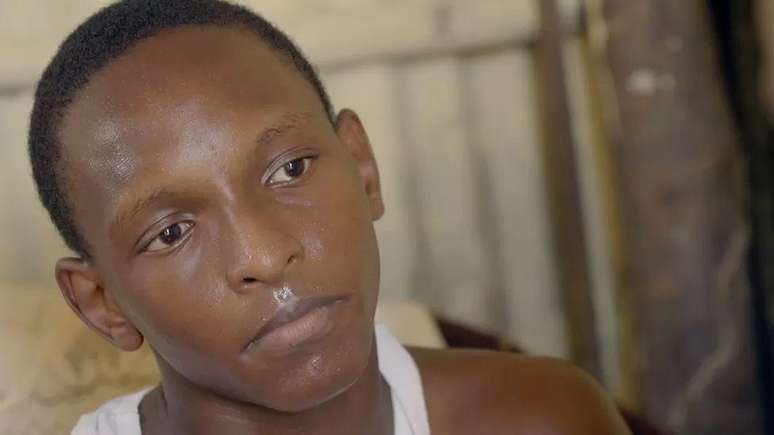Kenya is experiencing a silent epidemic of corporal punishment in schools, a practice that dates back to when missionaries and colonizers used physical aggression to assert their authority. Although the practice has been banned since 2001, people’s attitudes have yet to change. Over the past five years, local media have reported more than 20 deaths related to school beatings.
After overeating school breakfast in Kenya, Caleb Mwangi was beaten so badly that he was placed in an induced coma and spent 11 days in an intensive care unit.
“When I got there, he couldn’t get out of bed. He couldn’t talk,” his father, Fred Mwangi, told the BBC.
The attack occurred nearly two years ago, when Caleb was 13 years old. Sitting between mum and dad, on the sofa at home in Mombasa, a city on the Kenyan coast, he says that every now and then his head simply “turns off”.
The teenager is filled with anger, which sometimes leads him to punch the wall, an effect of the trauma caused by the near-death experience he experienced, he says.
Fred Mwangi stands his son up and pulls up his white vest to reveal the thick scar that covers almost the entire width and length of his back.
She says her son’s wounds were so deep that the surgeon had to remove large pieces of skin from Caleb’s thighs to use as a graft.
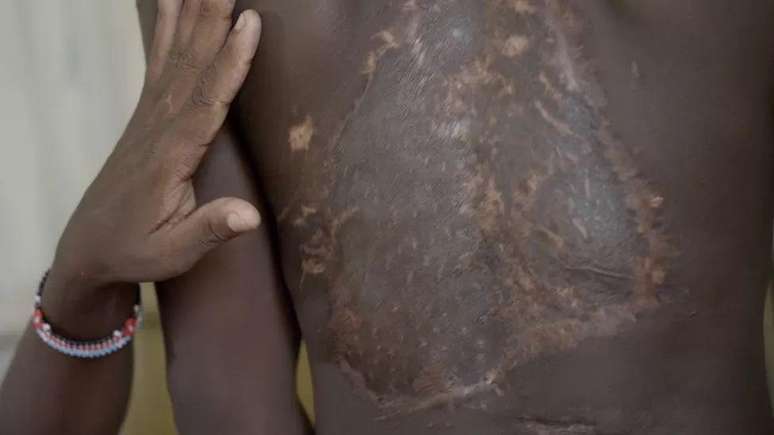
“This is him in the hospital,” says his mother, Agnes Mutiri, showing off Caleb’s cellphone photos, too vivid to publish. As he lay face down on the bed, lacerations covered his legs, back, arms and even his face. There were almost a hundred in total.
“His whole body felt like that.”
Corporal punishment in schools has a long history in Kenya, dating back to when missionaries and colonizers used physical aggression to assert their authority.
In 2001, the Kenyan government banned this practice in schools. But changing people’s attitudes has been more difficult.
Data from the latest Violence Against Children Report, a national household survey conducted in 2019, revealed that more than half of young Kenyans aged 18 to 24 agree that teachers need to use corporal punishment .
BBC Africa Eye has discovered a worrying increase in the number of serious cases reported.
In Caleb’s case, he says the person who first beat him was Nancy Gachewa, the principal of Gremon Educational Center, a school in the town of Bamburi, near Mombasa. She and then she gave the order to the other students to continue. Gachewa denies it and says she wasn’t at school when it all happened.
“I was so hungry that I took five chapatis and ate them with tea,” Caleb says.
Gachewa and an older student, Idd Salim, were arrested and charged with assault causing grievous bodily harm. Salim was sentenced to four years in prison last year and, in a plea deal, testified against Gachewa in court. The proceedings against the director continue.
While Caleb’s case is horrific, it’s not the only case. An official from the Teachers Service Commission (TSC), an independent organization that manages the teaching profession in Kenya, spoke to BBC Africa Eye on condition of anonymity.
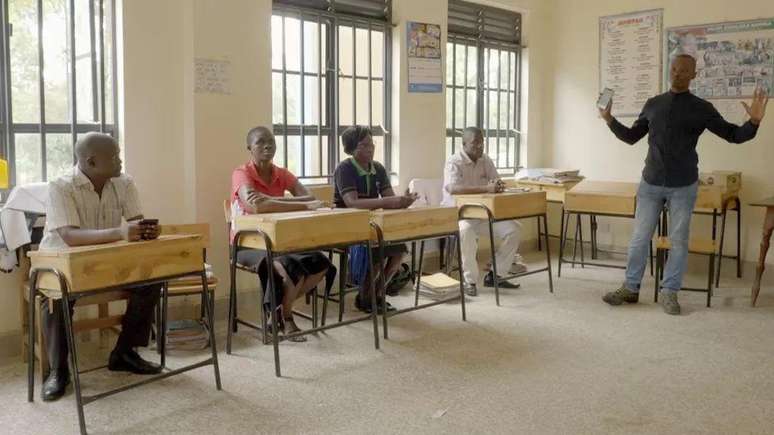
And he said that over the past three years, reports of serious beatings in schools have more than quadrupled, from seven to 29. And most incidents are never reported.
“It’s becoming a crisis and … we feel the situation is getting out of control. Cases of children being injured and maimed. Some of these cases have had very serious consequences, even death,” he said.
The source said cases of school beatings reported to the TSC at the district level are often not pursued, adding that the cases were “buried” and “never saw the light.”
“Often, by the time the case comes to us, a lot of evidence has already been corrupted. Sometimes we can’t even contact the witnesses.”
BBC Africa Eye contacted TS to respond to the allegations but received no response.
The idea that a student could die at the hands of education professionals who are supposed to protect them is unimaginable to most people, but in the past five years the media has reported more than 20 deaths related to school beatings.
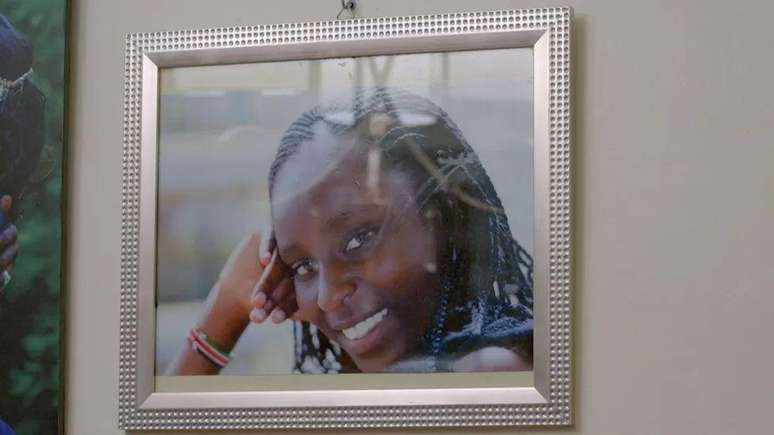
Fifteen-year-old Ebbie Noelle Samuels is believed to be one of them.
Ebbie was a boarding school student at Gatanga CCM Secondary School in Murang’a county, about 60 km (37 miles) north-east of the capital, Nairobi.
On March 9, 2019, her mother, Martha Wanjiro Samuels, was called from the school, where she was informed that her daughter was unwell and in the hospital.
When Samuels arrived, Ebbie was already dead.
The school said the girl died in her sleep, but witnesses say she was beaten by the vice principal because of the way she wore her hair.
“The autopsy report revealed that she had severe head trauma, blunt force trauma. Then someone hit her and caused that type of injury, leading to her death,” Samuels said.
For four years he campaigned for an investigation into his daughter’s death.
And last January, Elizabeth Wairimu Gatimu, a former deputy headteacher at Ebbie School, was arrested for murder. But she denies the accusations.
“I will do whatever it takes while I am alive to ensure that justice is done for my daughter,” he told Samuels, who is still waiting for the case to conclude.
“I said to myself, ‘I will not be silenced. I will not remain silent. I will not give up the fight.’ Maybe the day I give up will be the day I sleep like my daughter. But as long as I’m breathing, I won’t give up.”
BBC Africa Eye requested an interview with Kenya’s Ministry of Education, but no one would speak.
One organization that is pushing for change is Beacon Teachers Africa. Launched in Kenya four years ago by the non-governmental group Plan International, together with TSC, its aim is to give teachers the opportunity to protect children in schools and in their communities.
And it already has a network of 50 thousand teachers in 47 African countries.
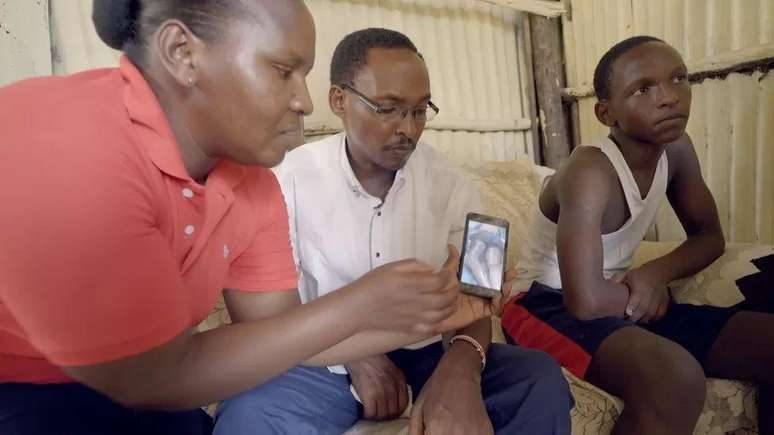
Robert Omwa is one of 3,000 Beacon teachers in Kenya. In addition to educating children about their rights, he also organizes workshops to train teachers on how to teach discipline without resorting to corporal punishment.
“At first I was skeptical. I thought it was Western ideology, that African children should be beaten. But when I tried it, I felt relieved as a teacher. I felt lighter. I felt that the children gravitated towards more towards me.” He said.
Back in Mombasa, Caleb and his family wait to know the fate of the school principal, who has declared herself innocent.
The 15-year-old still has difficulty processing what happened to him.
“In order for us to get justice, I want this woman arrested.”
You can watch the full English-language BBC Africa EYE documentary, Taught to Fear: Corporal Punishment in the Classroom, at BBC Africa YouTube channel.
Source: Terra
Rose James is a Gossipify movie and series reviewer known for her in-depth analysis and unique perspective on the latest releases. With a background in film studies, she provides engaging and informative reviews, and keeps readers up to date with industry trends and emerging talents.

